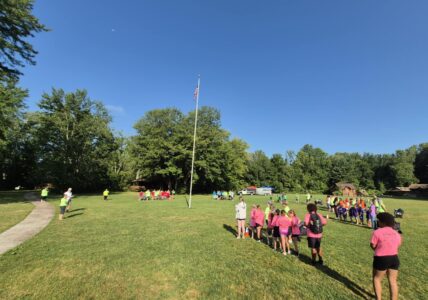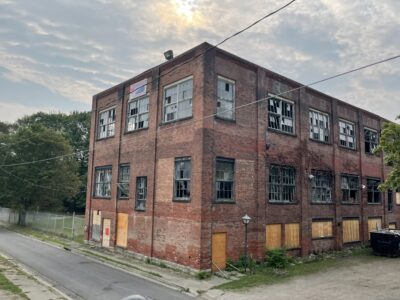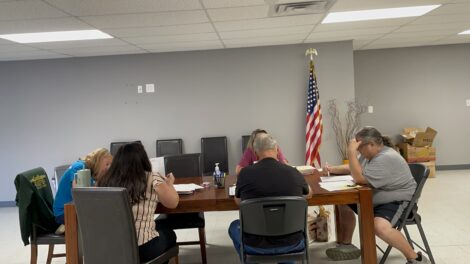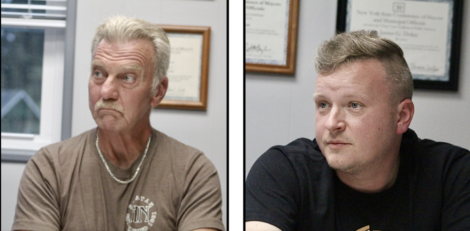Bach & Beyond Baroque Music Festival Continues Today
FREDONIA – Anticipation was rising as the tympani were turned and the audience assembled. The music was strategically placed on music stands and conversations of inquiry built. Programs were scanned for pertinent details as handshakes and salutations celebrated the intimate union in music. The Bach & Beyond Baroque Music Festival continues today at the historical 1891 Fredonia Opera House under the baton of Grant Cooper. The series of three concerts features work from known Baroque composers Bach, Vivaldi and Handel and lesser-known “beyond” composers Johann Schmelzer, Dieterich Buxtehude and Marco Uccellini.
The ensemble for this prestigious event consisted of musicians from across the country, gathering to perform as a group just once a year. Many have loyally participated for a decade or more and a few for the festival’s entire 21 years. They are accomplished in their field and regularly perform with symphony orchestras around the world. Many are reknowned teachers at music conservatories, colleges and universities. All are Baroque music scholars and many teach privately as their schedules allow.
This is the first year that choral works have been chosen for the festival. The 12 voices were selected for their proximity to SUNY Fredonia and their familiarity with the selected repertoire. Some are faculty, alumni and even students, according to Julie Newell, choral master.
“We’re very excited about presenting choral music,” said Rick Davis, opera house executive director. “Especially when you consider that fully one-half of Bach’s compositional output was vocal music, it’s incredible to think that we have never featured choral pieces in the festival before.” Julie Newell is a SUNY distinguished teaching professor of voice and opera at SUNY Fredonia, where she serves as director of the opera program. As a guest soloist, she has preformed throughout the United States, including the Lincoln Center and is highly recognized for leading operatic accomplishment.
Maestro Cooper, artistic director and co-originator of the festival, currently serves as artistic director and conductor of the West Virginia Symphony Orchestra and is known for his previous affiliation with the Fredonia Chamber Players. He has performed from Beijing to London, Carnegie Hall to the Kennedy Center and will conduct the Chautauqua Symphony and serve as resident conductor at the Eastern Music Festival. As a commissioned composer, he has created works of orchestral introduction for young audiences such as “Homage to Bach,” featured in last year’s festival. Cooper has been honored with a governor’s Award for Service to the Arts in West Virginia.
Julie Leven has been concertmaster since 2005 and is founder, executive and artistic director of Shelter Music Boston where she brings chamber music into the homeless shelters in greater Boston. Leven has performed as a soloist, concertmaster, and principal second violin with the Handel and Haydn Society of Boston.
The period organ was positioned on stage right, balanced by the tympani on stage left. Upstage center held as placement for the harpsichord with the conductor positioned downstage center. The three violins were right center and the three oboes left center. Downstage midlevel was the cello and the string bass. The festival choral ensemble was seated in the dress boxes aside of the proscenium with ladies stage right and men stage left. The stage was efficiently reset between works and adjusted for the orchestra composition. Ladies wore black and white choice concert dress. Some were fashioned with intricate crewled or eyelet tunics, complementing chiffon tiered long skirts. Men sported flat pleated tux shirts, bow ties, and classic black tux pants with cummerbund.
“Cantata BMV 169,” by Johann Sebastian Bach was the first presented work which was written as church cantata composed for an alto soloist for the 18th Sunday after Trinity. This was first performed on Oct. 20, 1726, and began with “Sinfonia,” meaning an orchestral piece often used as an introduction was played with a delicate and intricate blend of oboe grounded with cello and string bass. The counter melody was expressed on the period organ. The love of God was the focus for movements two through five: “Aropsp,” “Arie,” “Recitativ,” and “Arie.”
In the sixth movement “Recitativ” the commandment, to also love one’s neighbor, was expressed leading to the choral, which asks the Holy Spirit to bestow favor on us that we might love each other from our hearts and remain of one mind in peace, as paraphrased from the Bible. Countertenor Thomas Alaan sang the alto solo with incredible diction including ending consonants. His breath control and calisthenic diaphragm supported his significant and clean upper register. Justin Blackwell was articulate in the organ solo. The featured violins with tones that seemed to float in long extended phrases seemed to connect emotionally with Coopers hands of conduction. The Festival Chorale beautifully sang overlapping multiple moving layers. Alaan has been featured by ensembles, orchestras, and festivals across the country and was a national finalist in the Classical Singer Magazine Vocal Competition. He is Director of Women’s Schola and assistant conductor of choirs at Holy Name Cathedral and executive director of Chicago’s Bach and Beethoven Ensemble. Blackwell, organ/harpsichord, is the associate director of music at March Chapel, Boston University; a free-lance keyboardist; and plays regularly with numerous symphony orchestras in Florida and North Carolina.
– minor Bux Wv272″ by Dieterich Buxtehude were performed in a set by Julie Leven, violin; Justin Blackwell, harpsichord; and Bryan Eckenrode, violoncello. Leven appeared to play with balletic symmetry leaning in and out in music resolution and gentle lifts for composition dynamics. The period organ was in quiet accompaniment. Blackwell added a bright presence on the harpsichord. The complementing solo lines volleyed between the violin and cello with varied intensity. The allegro section of “Sonata” in A minor was phenomenal with fast violin bowing and elongated cello tones. At one point it appeared that a staccato echo alternated in rhythmic succession. Eckerode would embody phrases in gentle accent while playing beautiful lower registry harmonics in concert with the violin, cello and organ. The audience applauded in recognition with loud vocalization. Eckerode graduated cum laude from SUNY Stony Brook and holds a master of music degree from SUNY Buffalo. He is currently principal cello with the Western New York Chamber Orchestra and Southern Tier Symphony. He is known locally as conductor/music director of the Warren Philharmonic Orchestra and the Chautauqua Regional Youth Symphony. Eckenrode is an adjunct professor at four area colleges.
According to Cooper, the coronation hymns featured in this festival repertoire follow the order of service for the coronation of King George II. “Coronation Anthem: Let Thy Hand Be Strengthened” is George Frederick Handel’s best known coronation anthem uses text from the King James Bible and was designed to be played at the coronation of the British monarch. This composition was scripted around 1727 and first performed in Westminster Abbey, London England.
“Let thy hand be strengthened and thy right hand be exalted. Let justice and judgment be the preparation of thy seat. Let mercy and truth go before thy face. Let justice, judgment, mercy and truth go before thy face. Alleluia.” This work was skillfully conducted by Cooper and performed by the festival orchestra and choral ensemble who carefully calibrated the repeating lyrics including thy justice, judgment and mercy as directed.
“Trio Sonata V, hwv 384,” also by Handel contains four movements: “Adagio,” “Allegro,” “Grave,” and “Allegro,” was performed by Cheryl Bishkoff, oboe; Margie Cooper, violin; Justin Blackwell, harpsichord; and Hannah Whitehead, continuo. Bishkoff’s oboe performance was very expressive with staccato tones that paralleled laughter. One movement especially was drawn out apparently telling a story in minor key. Bishkoff just finished her 21st season as Principal Oboe of the Rhode Island Philharmonic and regularly performs with the Boston Ballet, the Symphony New Hampshire and the Pennsylvania Sinfonia. She is the Adjunct Artist of Oboe at Vassar College in Poughkeepsie and Wheaton College in Norton, Mass.
Margaret “Margie” Cooper has played First Violin in the West Virginia Symphony, is a member of the Syracuse Symphony and the Northeastern Pennsylvania Philharmonic. She has held many faculty positions including West Virginia University, Ithaca College, and SUNY Fredonia. During summers, Margie Cooper returns to play with the Chautauqua Symphony Orchestra.
Cellist Hannah Whitehead is a recent graduate of Carnegie Mellon University and has studied at the Eastman School of Music; completed a fellowship at the New World Symphony; and travelled around the world with Youth Orchestras of the Americas including Japan, Tokyo and England. Whitehead enjoys a diverse artistic career in the Pittsburg area.
“The King shall rejoice in thy strength, O Lord. Exceeding glad shall he be of thy salvation. Glory and great worship hast thou laid upon him. Thou hast prevented him with the blessings of goodness and hast set a crown of pure gold upon his head. Alleluia.” This is from Psalm 20 from the “Coronation Anthem: The King shall rejoice” by Handel. The first movement acknowledges the Kings joy in God’s power. Thy salvation is the text for movement two which was eloquently sung by the Festival Chorale with attention to the Allelujah as highlighted by Cooper in the pre-concert discussion. The coronation of the King with a crown of pure gold is described in movement three. Movement four was noted to be played at the precise moment was the King was crowned.
Johann Sebastian Bach was the featured composer for the festival concert on Saturday, consisting of Cantata bwv 82: Ich habe genug featuring Alaan and Bishkof. David Rose, viola was featured in Bach’s Chaccone (in G minor) BWV 1004. Rose has served a titled player of numerous orchestras, including Associate Principal of the Vancouver Symphony, Principal Viola of the Kitchener-Waterloo Symphony, Acting Assistant Principal of the San Francisco Symphony. He is currently associate professor of viola at SUNY Fredonia.
Saturday evening concluded with Bach’s famous choral work, “Magnificat, BWV 243,” which contains 12 movements which was performed on Sunday services, sung in German on ordinary Sundays but more elaborately and in Latin on the high holidays (Christmas, Easter and Pentecost).
The festival concludes Sunday afternoon with works including Bach’s “Cantata BWV 170” featuring Alaan and Blackwell; “Concerto in C – major for Mandolin, F.V. no. 1” by Antonio Vivaldi highlighting Brian Walnicki on the mandolin. Walnicki has served as the Principal Viola for the Western New York Changer Orchestra since 2004 and plays with several orchestras including the Erie Philharmonic, the Erie Chamber Orchestra, the Buffalo Philharmonic and the Chautauqua Symphony. He plays viola in the fusion rock band Ould Pound and octave mandolin with The Bards. He holds a bachelor’s degree in performance for the Eastman School of Music and a master’s degree in performance from SUNY Fredonia. Additional featured works include “Coronation Anthem: My Heart is Inditing,” by Handel; “Aria Sopra la Bergamasca”; “Sonatina No. 1,” from Dudena Selectrarum Sonatarum; “Gulliver Suite”; concluding with “Coronation Anthem: Zadok the Priest.
Baroque musicians and choral singers who performed but not previously mentioned include: David Anderson, trumpet; Kyle Botsford, baritone; Mark DuBois, oboe; Tyler Eighmey, tenor; Suzanne Fatta, contralto profundo; Angela Haas, soprano; Dr. Sarah Hamilton, oboe, Marie Karbacks, soprano; Laura Koepke, bassoon; Peter Lindblom, trumpet; Michael Manganiello, baritone, Steven Maynard, tenor; Jon Pascoline, double bass; Dr. Susan Royal, woodwind; Steven Rudman, bassoonist; Kay Stonefelt, percussion; Jeffrey J. Thompson, tenor; Laurie Tramuta, mezzo soprano; Jay Villella, trumpet; David Waterland, baritone and J. Nicole Zenns, flute.
Attendance at the 21st annual Bach and Beyond Baroque Music Festival is highly recommended, including the pre-concert conversation where Cooper spoke in common order including the composition history and modern application of the selected Baroque repertoire. Unending detail as to the authenticity and natural acoustic sound for this festival was most interesting with Cooper’s desire expressed for each element to be heard and appreciated in it’s pure form. “An orchestral-choral embrace,” was his reference not the orchestra over powering the chorale or the Strings over the Harpsichord. The musicality of this Festival was phenomenal, a pure blessing and uplifting gift to the natural ear. Visualization was difficult at times especially with the full orchestral and choral composites, which interfered with sensory integration. Newell spoke of the wonderful Proscenium and complemented acoustics of the 1891 Fredonia Opera House that is a landmark fixture on Fredonia’s Baker Commons. The year-round facility was restored to its Victorian splendor and offers a wide range of programing including music, theater, dance and cinema. The Bach & Beyond Festival is made possible, in part, with public funds from the New York State Council on the Arts, a state agency, and with the support of the United Arts Appeal of Chautauqua County. Founding festival benefactors are Carol and Jim Boltz. Festival Sponsors are June & Barry Dietrich, and W. Stanley Hooper with the Hooper Family Foundation; and Concert Sponsors are Minda Rae Amiran and Evans & Evans Law Offices.
The Bach & Beyond Baroque Music Festival continues today at the Fredonia Opera House. The pre-concert conversation starts at 1 p.m. The ensemble and choral repertoire begins at 2 p.m. Complete concert programs are listen on the Opera House website at www.fredopera.org. Tickets may be obtained by contacting the Fredonia Opera House at 679-1891 and are available online accordingly.





